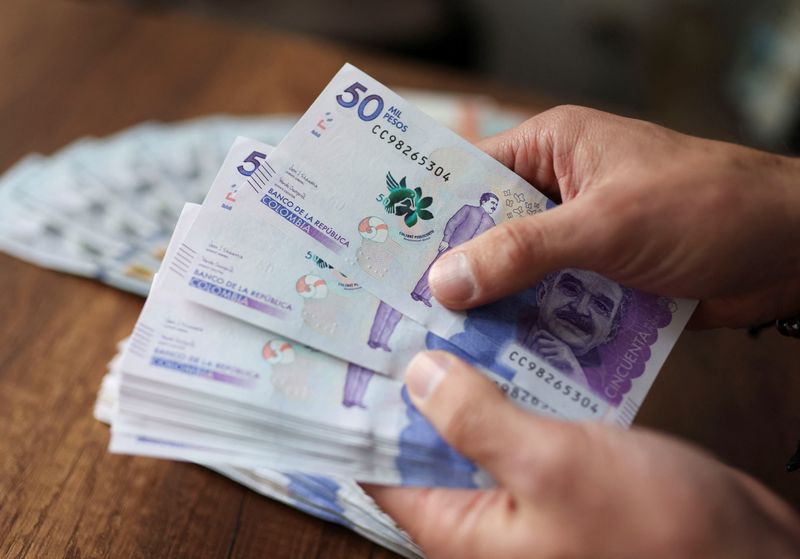By Vivek Mishra and Vuyani Ndaba
BENGALURU/JOHANNESBURG (Reuters) - Emerging market currencies will struggle to reclaim the ground lost this year, as high U.S. Treasury yields and safe-haven demand amid a slowing Chinese economy keeps the dollar ascendant, a Reuters poll of FX analysts found.
A stampede into the greenback pushed the wider index of emerging market currencies to its lowest in two weeks on Monday as U.S. Treasury yields and the dollar advanced on expectations interest rates will remain high.
The dollar index has surged more than 5.0% since its 15-month nadir in July. That has put pressure on risky EM currencies, echoing the dynamics observed last year when the Fed began raising rates.
In the Sept. 1-6 poll, almost all beaten-down emerging market currencies were forecast to move little, or trade modestly higher against the dollar in a year, with some making small gains in three months.
Still, most won't recoup heavy losses made so far this year.
"If we still have a very strong dollar, I think EM currencies for the next month or two will probably remain on the back foot," said Chris Turner, head of FX strategy at ING who added the main risk would be higher U.S. rates for longer.
"The view was China was reopening, and there was going to be this big bounce in domestic demand that would drive global trade, but that just hasn't really happened. The underperformance of China has probably been the biggest story holding back EM currencies."
Earlier this year, many analysts expected China's reopening to boost the yuan and other EM currencies, especially those exporting commodities to the world's second-largest economy, but this scenario did not unfold as anticipated.
Instead, China's yuan has fallen about 6% to a near 16-year low this year as a likely end of the country's economic boom hurt the commodity exporter.
China's tightly controlled yuan was predicted to have only appreciated about 1% to 7.26 per dollar in three months.
"With China's economy under pressure, the emerging Asia currency complex should also turn somewhat volatile. Through the end of this year, we believe most EM Asia currencies can weaken," said Nick Bennenbroek, international economist at Wells Fargo (NYSE:WFC).
"However, with underlying fundamentals relatively strong, central banks maintaining adequate FX reserves to stabilize their currencies, and central banks not pivoting toward easing just yet, depreciations should be modest."
Typically volatile Asian currencies will remain relatively stable, in part because central banks will manage stability using FX reserves, which have grown 40-fold in the last three decades.
After a 10% fall last year, the Reserve Bank of India has helped confine the rupee within a tight range of 80.88-83.18 per dollar so far this year. It was forecast to trade in that range in 12 months.
The Korean won was expected to gain about 2% to 1,308.5/$ in three months after falling over 5% this year.
The Russian rouble, which has lost over 25% this year despite its main export Brent crude oil being up over 5%, was predicted to only gain about 3% to 95.24/$ in three months. The rouble will fall to 99/$ in a year.
South Africa's rand, a high-yielder, which has lost about 12% this year as the country suffered the worst power cuts on record, was expected to just gain about 4% in three months to 18.53 per dollar.
Hugo Pienaar, chief economist at the Bureau for Economic Research said a likely easing in the intensity of power cuts should also boost foreign investor sentiment towards South Africa and the rand.

Turkey's lira, the worst-performing emerging market currency last year and this, is already down 30% in 2023 and is set to fall about another 13% to 31.03/$ in 12 months.
(For other stories from the September Reuters foreign exchange poll:)